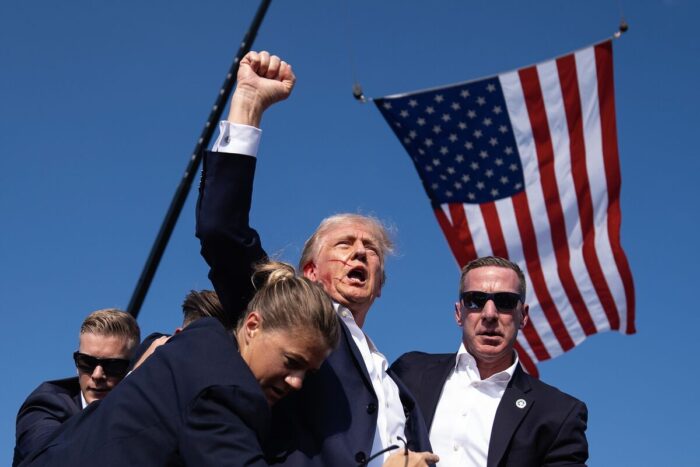By Yusuf Mohammed
Make America Great Again, popularly known as MAGA, was Donald Trump’s defining slogan when he first ran for president in 2016. It resonated deeply with millions of Americans who had grown weary of their country’s entanglements in foreign conflicts. Trump positioned himself as the outsider willing to put “America First,” challenging the political establishment and the military-industrial complex.
During the 2016 campaign, in an interview with CNN’s Jake Tapper, Trump criticized NATO’s role in the removal of Libya’s Muammar Gaddafi and Iraq’s Saddam Hussein. Despite their authoritarian rule, Trump argued that these leaders had served as buffers against terrorism. Their removal, he said, unleashed chaos and fueled a refugee crisis, leading to a wave of migration that strained Western societies.
Trump’s anti-interventionist message, “No more wars” and “America First” stood in stark contrast to Hillary Clinton, his Democratic opponent, who was widely viewed as a foreign policy hawk. As a former Secretary of State under Barack Obama, Clinton was closely linked to the decisions that destabilized the Middle East. In fact, Obama, often dubbed the “bomber-in-chief,” oversaw significantly more airstrikes than his predecessor, George W. Bush.
It was widely believed that arms manufacturers and defense contractors were uneasy about a potential Trump presidency. Nevertheless, he won, and largely kept his promise by avoiding new wars during his tenure. For that, Trump was credited by supporters and critics alike for overseeing a relatively peaceful global period.
But the landscape has since shifted.
Trump lost to Joe Biden in the 2020 election. Not long after, Russia invaded Ukraine. Biden’s rhetoric and foreign policy moves were criticized for escalating tensions rather than easing them. Then, on October 7, 2023, Hamas launched a surprise attack on Israel, triggering a brutal Israeli response. Since then, over 55,000 Palestinians, most of them civilians and children, have reportedly been killed in Gaza.
Once again, foreign policy has taken center stage in American politics. Many voters were dissatisfied with Biden’s handling of the Ukraine war and his unwavering support for Israeli Prime Minister Benjamin Netanyahu. Trump, once seen as an anti-war populist, has raised eyebrows for his increasingly vocal support of Israel—both during and after Biden’s presidency.
Although he survived two assassination attempts during the campaign season, further solidifying his image as a political maverick, Trump’s tone on Israel during the campaign and today as the Iran and Israel conflict escalates, is causing discomfort among parts of his base. Critics are beginning to ask: Is MAGA turning into MIGA—Make Israel Great Again?
Several prominent Trump supporters have voiced concern. A former Fox News commentator Tucker Carlson posted on X (formerly Twitter): “The United States should not at any level participate in a war with Iran. No funding, no American weapons, no troops on the ground. Regardless of what our ‘special ally’ says, a fight with the Iranians has nothing to offer the United States.”
Conservative commentator Candace Owens went even further, stating: “Our foreign policy is dictated by Israel. Trump will continue to do as he is told by Netanyahu. If you want to know what America will do, spare yourself the fake White House press briefings and start listening to Bibi [Netanyahu]. We are a colony of Israel. Your politicians are bought and paid for.”
Republican Congressman Thomas Massie echoed similar concerns after Trump’s statements on Iran and Israel: “Israel doesn’t need U.S. taxpayers’ money for defense if it already has enough to start offensive wars. I vote not to fund this war of aggression.”
Even Charlie Kirk, founder of Turning Point USA and a staunch Israel supporter, conducted a poll on X asking: “Should the U.S. get involved in Israel’s war against Iran?”
The result was telling—89.7% voted “No,” and only 10.3% supported intervention.
These reactions show that Trump’s support base remains firmly rooted in the America First philosophy. His followers are not blind loyalists; they are principled citizens who expect consistency between rhetoric and action.
Going forward, Trump faces a choice. He can continue down the path of aligning U.S. interests with Netanyahu’s Israel, or he can return to the core of what made his 2016 campaign successful: putting America above all else.
For the sake of his legacy, there is still time for Trump to pivot from MIGA back to MAGA.
Yusuf Mohammed studied History and International Relations. He is a journalist based in Lagos, Nigeria.



